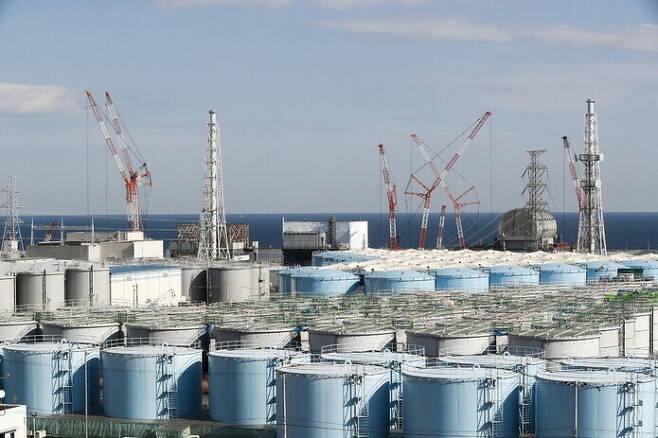Japan to release Fukushima water into sea in 2 years despite opposition at home, abroad
이 글자크기로 변경됩니다.
(예시) 가장 빠른 뉴스가 있고 다양한 정보, 쌍방향 소통이 숨쉬는 다음뉴스를 만나보세요. 다음뉴스는 국내외 주요이슈와 실시간 속보, 문화생활 및 다양한 분야의 뉴스를 입체적으로 전달하고 있습니다.

The Japanese government decided Tuesday to start in two years with the ocean release of radioactively contaminated water currently being stored in tanks on the Fukushima Daiichi Nuclear Power Plant site.
While South Korea, China and other neighbors of Japan strongly protested Japan's decision, the US supported the move.
The Japanese government announced that a decision had been made at a meeting of related Cabinet ministers that morning to dump the roughly 1.25 million tons of contaminated water currently being stored in tanks at the Fukushima site into the ocean over 30 years, after first reducing the concentrations of radioactive materials to below the legally prescribed thresholds.
During the meeting that day, Prime Minister Yoshihide Suga called the water's release an "unavoidable step in the decommissioning of the Fukushima Daiichi Nuclear Power Plant."
The prime minister's office was reportedly aggressive in its push for the decision. This appeared to be based on the determination that with a political calendar including the Summer Olympics in Tokyo and a House of Representatives election this fall, it was the optimal time to decide on how to handle the contaminated water issue.
Decommissioning efforts have been underway since the Fukushima Daiichi reactor's operations were halted by an explosion in the wake of a major earthquake in eastern Japan in 2011.
The amount of contaminated water has been increasing due to the use of water as a nuclear fuel coolant and the infiltration of underground water and rainwater into the power plant building. Contaminated water is currently being stored in roughly 1,000 tanks located at the Fukushima Daiichi site, but according to the Japanese government, it will be unable to store any more water by around fall 2022 due to a shortage of tank capacity.
South Korea, China and other neighbors of Japan have joined international environmental groups in raising issues with the safety of dumping radioactive water from Fukushima.
Despite the Tokyo Electric Power Company (TEPCO) having already carried out one purification process with an advanced liquid processing system (ALPS) to remove multi-nuclides, around 70 percent of the contaminated water in the tanks still contains potentially lethal radioactive materials at concentrations above threshold levels, including strontium, cesium and iodine.
Another growing source of concern is the lack of testing on the damaging effects on human health from the large-scale release of tritium, a hydrogen isotope that is capable of causing radiation damage in the human body and that cannot be removed by the ALPS process.
A day ahead of the decision — which was already seen as a foregone conclusion — the Japanese private think tank Citizens' Commission on Nuclear Energy blasted the Japanese government and TEPCO for "not concretely examining alternative approaches."
Civil society had been proposing alternative methods such as storing the water in large aboveground tanks or using mortar solidification to contain it with concrete. According to critics, the government decided to use the comparatively inexpensive ocean release approach early on and never examined other alternatives.
The government also ignored the roughly 70% rate of opposition to the ocean release plan that it found through its public comment opinion-gathering process with the Japanese general public.
"There has been no national debate, and there's no understanding whatsoever about the safety of the treated water. It's incomprehensible that the decision was made in this way," a Fukushima Prefecture fisheries cooperative official said in a Tuesday interview with the NHK network.
The same day, Koo Yun-cheol, head of South Korea's Office for Government Policy Coordination, presided over an emergency meeting of vice ministers in related agencies, including the Ministry of Foreign Affairs (MOFA), the Ministry of Oceans and Fisheries and the Nuclear Safety and Security Commission, which was followed by an expression of strong dismay by the South Korean government.
In addition, Second Vice Minister of Foreign Affairs Choi Jong-moon summoned Japanese Ambassador to South Korea Koichi Aiboshi to the foreign ministry in Seoul to share a message of strong protest.
China also denounced the "unilateral and irresponsible decision" by Japan in a statement credited to its foreign ministry spokesperson.
In contrast, US State Department spokesperson Ned Price said in a statement that Japan "appears to have adopted an approach in accordance with globally accepted nuclear safety standards."
By Kim So-youn, staff reporter
Please direct comments or questions to [english@hani.co.kr]
Copyright © 한겨레. 무단전재 및 재배포 금지.
- 격화되는 이스라엘과 이란의 ‘그림자 전쟁’
- 일본 ‘오염수’ 방출, 한-일 관계 악화 결정적 ‘뇌관’되나
- ‘전효관 이해충돌 논란’ 3년 전 서울시의회도 지적 했었다
- 대만 유학생 숨지게 한 음주운전자에 구형보다 무거운 ‘징역 8년’
- 수에즈 운하 좌초 선박, 이번엔 배상금 때문에 발 묶여
- 비운의 왕 단종의 ‘15살 어진’ 만나보세요
- 특별한 진돗개와 ‘조금 평범하게’ 사는 법
- 첫 아이 낳으면 920만원, 둘째는?…가평군 출산장려금 확대
- 김종인 “‘아사리판’ 국민의힘 절대 안 간다, 윤석열도 안 갈 것”
- AZ 백신과 닮은꼴 얀센 백신…혈전 부작용까지 닮을까